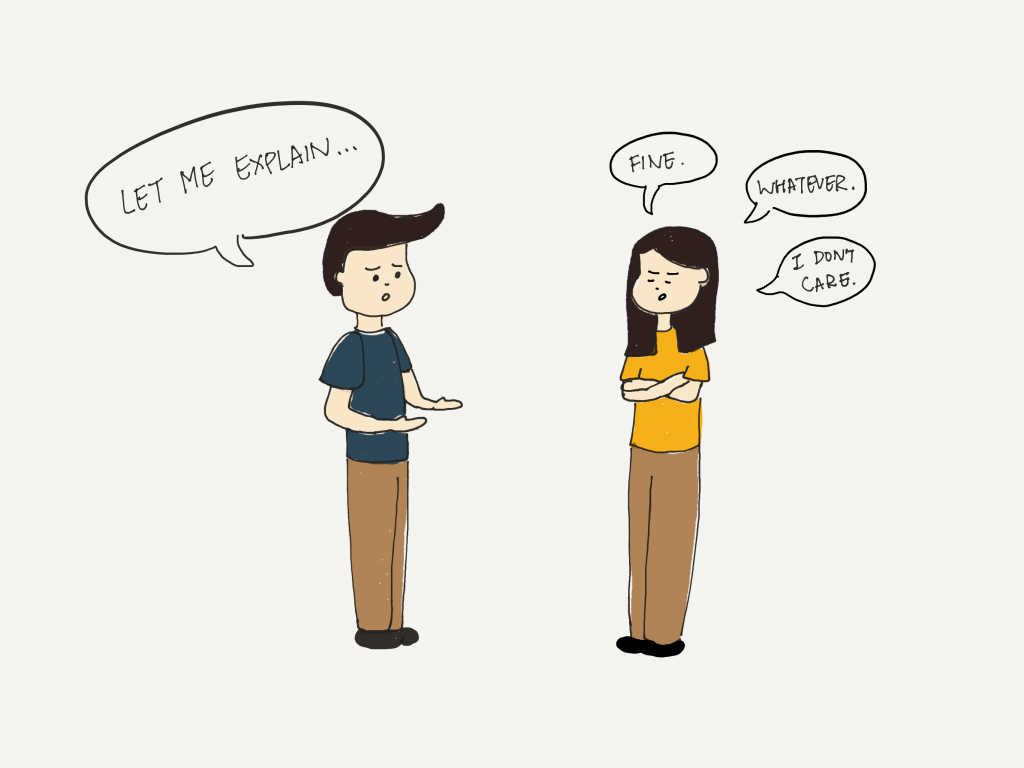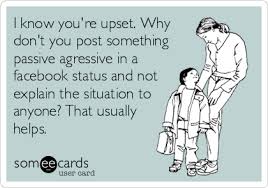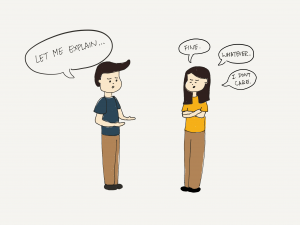4 Signs of Passive Aggressiveness

4 Signs of Passive Aggressiveness
Did you ever have the feeling that you were unreasonably creating problems to yourself or that you were being stubborn for no obvious reason other than wanting things your way? If yes, I’m sorry to inform you that you might be suffering from passive aggressiveness.
Passive aggressiveness (PA) is a type of behaviour characterised by „indirect resistance to the demands of others and the avoidance of direct confrontation“. It is also described as a „pattern of negativistic attitudes and passive resistance to demands for adequate performance in social and occupational situations“.
In general, being passive aggressive will only give you and people around you trouble. PA is damaging to team work and unity productivity, especially in your occupational environment. As a defense mechanism, it gives people who are afraid to be publically aggressive the chance to express the negativity they’re withholding. They still get what they want, but they camouflage it in a way that seems as if they’re trying to please others.
PA might be triggered by stimuli that took place while we were still kids. An environment unsafe to express certain feelings, such as frustration, anger, aggressiveness etc. In this way, the mechanism of oppressing our feelings and bottling them up inside of us, is, in fact, taught by our families.

Some signs of PA are the following:
- Hiding Anger
This, as the title suggests, means that we don’t let out the anger we experience. It may be accompanied by stubbornness, feelings of resentment and sullenness. In other words, keeping grudges is a PA characteristic. You might also want to consider obstructionism a sign, as the creation of a variety of problems, only causes more anger and frustration. - Avoiding Direct Communication
This is the main point of being passive aggressive. This means that we don’t openly deal with our problems. Other signs of this might be blaming others for things we couldn’t get right to avoid an upcoming argument. - Procrastination
Another major sign of PA. Before you say that you don’t procrastinate, think of all the times you made up excuses to avoid meeting a friend or get something done at work. And what about that time when you spent the entire day at home to evade any possible problem? Yeah, I thought so as well. - Fear of Intimacy and Competition
Unwillingness of someone to open up too fast or too not want to compete others, is not necessarily a PA sign. However, when we’re trying to get to know somebody and we cover up our feelings with sarcasm, we don’t allow people to know us at all. Not knowing how we truly feel about things, keeps others at bay and makes them lose interest in us. And do you know what really drags us down a people? Learned helplessness and deliberate or repeated failure. Playing victim after not getting something done ou way, isn’t helpful to anyone, really.
These are the four (4) most important signs of a PA person. But how are we really letting our PA self show? Here are a few things we say that usually give us away.
- „I don’t mind“ doesn’t let others know what we’re thinking as it’s a way of not admitting our feelings.
- „Fine, whatever“ is a very common thing to say to walk out of an argument. Many people believe that openly expressing anger will make their lives worse.
- „I’m coming“ but never really showing up to complete a chore and only using this as a temporary compliance.
- „I didnt know you meant now“ is another common technique to procrastinate. Only that this one also frustrates. It is a way of getting away from certain chores without having to clearly decline doing them.
- „I thought you knew“ is to express omission and fake claim ignorance, defending our inaction.
- „I was only joking“ is to compliments. It’s expressing hostility, but in a way that is socially acceptable and won’t give people trouble. At least most of the times. It might as well be followed by…
- „Why are you getting so upset?“ which is to show that while we can, even superficially, keep up our own calmness, we can also make others blow up in anger.

Passive-aggressive is a personality type with an indirect expression of hostility.
How can a non-passive-aggressive person know their dealing with one? Some characteristics of this behaviour are that these people will rarely ever compliment others, they’re very silent, as they’re always trying to avoid conflict and their insults are disguised. To respond to these people, you have to be assertive when you speak and avoid beating around the bush. You also want to show them that their actions will have clear consequences. Don’t let them think they’ll go unpunished.
Being a passive aggressive person myself, I tried to talk through my problems once I realised and stopped giving people the silent treatment. The result of this was that my life became so much easier and stress-free. I can assure you, that expressing anger or frustration in a seemingly non-hostile way won’t get you anywhere. It only increases anxiety and leads you to miss out on a great deal of friendships, partnerhips and activities.
Are you passive aggressive? Share with us on the comment section below.
You might also want to check out:
10 Ways To Tell if an Introvert Is Mad At You
https://psych2go.net//7-ways-boost-emotional-intelligence-dealing-anger/
https://psych2go.net//childhood-trauma-affect-us-interview-andrea-brandt/
Sources
- Oxford Dicinaries| English, Retrieved 2017-09-08
- Diagnostic and Statistical MAnual of Mental Disorders (DSM) Revision IV
- https://en.m.wikipedia.org/passive-aggressive_behavior
- http://urbandictionary.com/define.php?term=passive%20Aggressive
- https://www.psychologytday.com/blog/passive-aggressive-diaries/201011/10-things-passive-aggressive-people-say
- https://www.dailyworth.com/posts/3462-signs-you-re-being-passive-aggresive
- http://time.com/4916056/passive-aggressive-definition-meaning
- https://greatist.com/grow/respond-to-passive-aggressive-behavior



Hi psych2go! I really enjoy reading your works and I even watch and subscribed to your channel on youtube.
After reading this, I actually realized that I am a passive-aggressive person.
Since I discivered your page in Facebool and your channel on Youtube, I am starting to learn about my behaviors, on why I do act like that and that.
I have many questions about myself.
I really admire you for always giving information to a person like me who don’t understand their ownselves.
Actually, you’re motivating me to pursue Psychology as well.